Events
Congratulations!
We are holding an RRS department in-person graduation ceremony for scholars who graduated in 2019, 2020, 2021 and 2022. We are hoping you and your family can join us.
Event Information:
Monday, May 23rd, 2021
Jack Adams Hall
1600 Holloway Avenue
4-7pm (in-person)
Light meal will be served.
All students must register for the ceremony by filling out and returning the information before May 6th, by clicking on this link.
RRS Grad Questions:
- What do I wear?
Graduates can wear their Cap and Gowns or Cultural traditional clothing.
- How many tickets do I get?
Each Graduate will be given up to 5 tickets for family and friends, depending on the number of graduates attending.
- What is the covid protocol?
Masking and social distancing is required. For more information: Document with information
- How Do I RSVP?
Click here: https://forms.gle/QaXp5uoFpVAgJ3ch7
If you have any questions, please feel free to reach out to: (415) 338-1052 OR gautam@sfsu.edu
Thank you and hope to see you soon,
Rama Ali Kased
on behalf of the RRS graduation committee
RRS Presents:
A Book Talk: You Have Not Yet Been Defeated By Ala Abd el-Fattah with Guest Speakers Angela Davis and Sanaa Seif, Moderated By Rama Ali Kased and Sharif Kouddous.
May 10th 3-4:30p Location: SFSU Library 121 ALSO on Zoom
In celebration of AA&PI History Month, Asian American activists from 1968 will be joiing us to share their experiences in the student strike, how their activism prepared them for life and perspectives about contemporary student activism.
RSVP: bit.ly/AAPI-68StudentStrike
In collaboration with College of Marin's Psychological Services and the Puente Program, please join us for an evening to gather in community together for this very special event that spotlights music by SFSU RRS Professor Rey Lara. He will be sharing music that speaks to his own personal journery with mental health. This event centers on some of the struggles and strengths experienced by Professor Lara, as well as a member of the Latino/a/x/e and Indegenous People. One of the songs featured for the evening was written and performend by Professor Lara entitled, The Warrior Is You:
https://soundcloud.com/evolvingwings/the-warrior-in-you-remix?utm_source...
Come join Pacific Islander students, faculty and staff at SFSU for our Pacific Islander Student Research Showcase!
_0.png)
.png)
.png)
.png)
.png)
Register in advance for this meeting:
https://sfsu.zoom.us/meeting/register/tZwkd-qrrT8uHdCke8mp5cJKguks8-vsgPtm
After registering, you will receive a confirmation email containing information about joining the meeting.
Scan the code or click the link to register:
https://sfsu.zoom.us/meeting/register/tZYtf-qqrDMpG9fqfqq49wXqIDqFRK29jtHi
Scan the code or click the link to register:
https://sfsu.zoom.us/meeting/register/tZcof-uoqDMoG9I36KEDwmKAEgBawg_39sNJ
Scan the code or click the link to register:
https://sfsu.zoom.us/meeting/register/tZ0sc-ihrzspGddpyaE5CV0eXPpVClqh5UD7
Register Here for Dionte Harris Student Meet-up:
https://sfsu.zoom.us/meeting/register/tZEvf-mpqjojG9Qd8eu6mpjgBpzD8KSldOYy
Scan the code or click the link to register:
https://sfsu.zoom.us/meeting/register/tZYsd--vrTkuGtyRoFKTjwegvcPGMjdLS2ga
Scan the code or click on link to register
https://sfsu.zoom.us/meeting/register/tZEqf--grjIpGdy4fne4Rpz9uL4HCXqu1g9C
Register Here:
https://bit.ly/3mGvETC
Saturday May 22, 2021: 5-7pm
please register here: https://sfsu.zoom.us/meeting/register/tZcsc-CoqDosH9Kg4TK5GdO65uxpNqVmFk49
Schedule of graduation ceremony TBA in details
Faviana Rodriguez 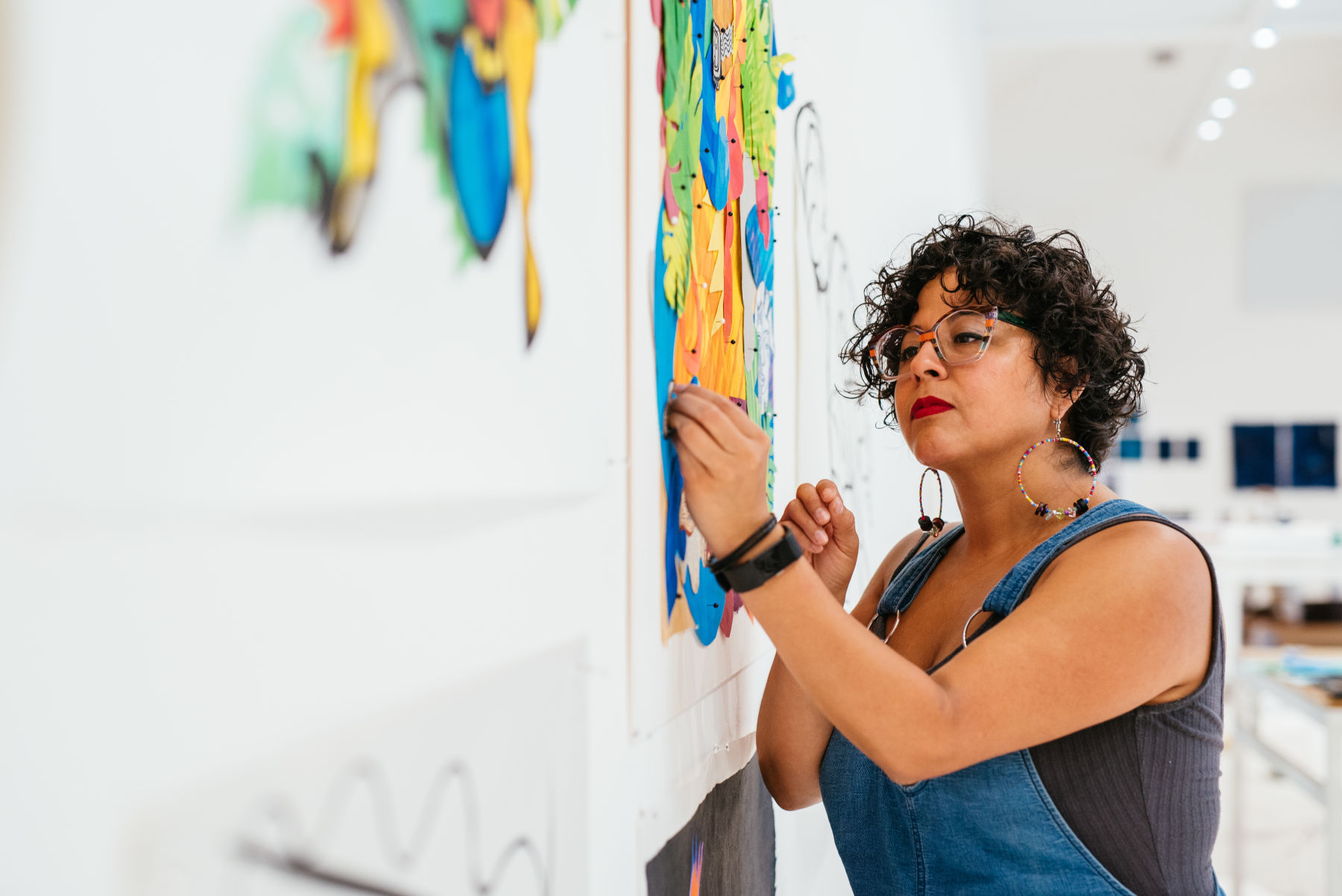
Favianna is an interdisciplinary artist, cultural strategist, and social justice activist based in Oakland, California. Her art and praxis address migration, gender justice, climate change, racial equity, and sexual freedom. Her practice boldly reshapes the myths, stories, and cultural practices of the present, while healing from the wounds of the past. Favianna's projects include Ben & Jerry's Pecan Resist, two large scale public art commissions with the City of San Francisco, a partnership with Jill Solloway to create 5050by2020.com, and an upcoming storytelling initiative at the US Mexico border. Her work serves as a record of her human experiences as a woman of color embracing joy, sexual pleasure and personal transformation through psychedelics as an antidote to the life-long impacts of systemic racism. Her signature mark-making embodies the perspective of a first-generation American Latinx artist with Afro-Latinx roots who grew up in Oakland, California during the birth of hip hop and the crack cocaine epidemic.
Favianna's practice includes visual art, public art, writing, cultural organizing and power building. She leads meaningful collaborations with social movements that lead to resilient and transformative cultural strategies. In addition to her expansive studio practice, she is the co-founder and president of The Center for Cultural Power, a national organization igniting change at the intersection of art, culture and social justice. In 2016, Favianna received the Robert Rauschenberg Artist as Activist Fellowship for her work around immigrant detention and mass incarceration. In 2017, she was awarded an Atlantic Fellowship for Racial Equity for her work around racial justice and climate change. In 2018, she received the SOROS Equality Fellowship for organizing artists activists. An artist entrepreneur, she has co-founded various institutions, including the EastSide Arts Alliance, a cultural center and affordable housing complex in Oakland, CA, and Presente.org, the largest Latino online organizing community in the US. She is currently working on a short form, web-based series about sex and consent.
Jessa Calderon 
Jessa Calderon is the Coordinator of Indigenous Oceans and Waters Protector Program for Sacred Places Institute. Jessa is a Tongva and Chumash songwriter, poet, hip hop artist, performer, hypnotherapist, massage therapist, energy worker and offers guided meditations. Jessa encourages our community and youth to find their healing mentally, physically and spiritually through her words, music and practices. Jessa has had the privilege to work with community and youth from many Nations, helping them find themselves while helping them to feel good about themselves.
Gopal Dayaneni (facilitator) 
Gopal has been involved in fighting for social, economic, environmental and racial justice through organizing & campaigning, teaching, writing, speaking and direct action since the late 1980’s. Gopal did his undergraduate studies at UC Davis, graduate studies in education at UC Berkeley and was the first Climate Justice Fellow in the Urban Sustainability Masters of Arts program at Antioch University, Los Angeles, where he continues to teach in graduate and undergraduate programs.
Link to Recording HERE
Passcode: P9v%ou%P
Prompt:
We hope that the session with Favianna and Jessa inspired you to see the central role of culture, art and creativity in transformative change for Climate Justice. Create a piece of art (no constraint on medium: poster, painting, song, poem, collage, etc.) on a theme of Climate Justice. Your art can draw on themes raised in this past talk, the previous talks, your classes or your own experience. Your art can be designed to educate and/or inspire action and organizing. Please include a short description and explanation of your artwork.
Faculty and Student Resources:
(1) Read: What is Cultural Organizing by Paul J. Kuttner
(2) Watch:Climate Woke!
(3) Check Out:The Center for Cultural Power Climate Art Gallery
Naomi Klein 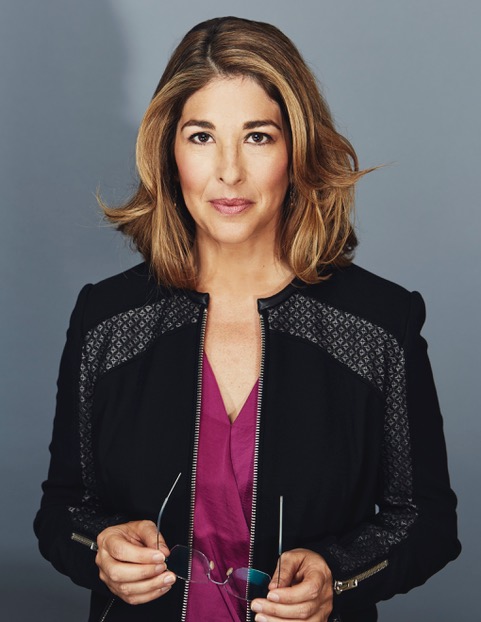
Naomi Klein is an award-winning journalist and New York Times bestselling author. She is Senior Correspondent for The Intercept, a Puffin Writing Fellow at Type Media Center and is the inaugural Gloria Steinem Endowed Chair in Media, Culture and Feminist Studies at Rutgers University. Her groundbreaking books include How To Change Everything: The Young Human’s Guide to Protecting the Earth and Each Other (2021), On Fire: The (Burning) Case for a Green New Deal (2019), No Is Not Enough: Resisting the New Shock Politics and Winning the World We Need (2017), This Changes Everything: Capitalism vs. The Climate (2014), The Shock Doctrine: The Rise of Disaster Capitalism (2007) and No Logo (2000). In 2018, she published The Battle for Paradise: Puerto Rico Takes On the Disaster Capitalists (2018) reprinted from her feature article for The Intercept with all royalties donated to Puerto Rican organization juntegente.org.
After This Changes Everything was published, Klein’s focus was putting its ideas into action. She is one of the organizers and authors of Canada’s Leap Manifesto, a blueprint for a rapid and justice-based transition off fossil fuels endorsed by over 200 organizations, tens of thousands of individuals, which inspired similar climate justice initiatives around the world. She is now a co-founder and advisory board chair of The Leap, a climate justice organization developed from the Manifesto that exists to inject new urgency and bold ideas into confronting the intersecting crises of our time: climate change, racism and inequality.
Miya Yoshitani 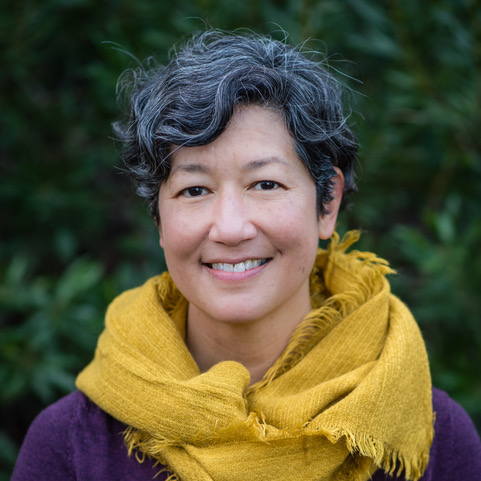
Miya Yoshitani has been the Executive Director of the Asian Pacific Environmental Network since 2013. Starting at APEN as a youth organizer in the 1990’s, Miya has an extensive background in community organizing, and a long history of working in the environmental justice movement. APEN has been fighting – and winning – environmental justice struggles for nearly three decades and remains one of the most unique organizations in the country explicitly developing the leadership and power of poor and working class Asian American immigrant and refugee communities. Through many years of leadership, Miya has supported APEN’s growth and expansion from a powerful local organization in the Bay Area, to having a statewide impact through an integrated voter engagement strategy and winning transformational state policy for equitable climate solutions for all Californians. A movement leader in many key local, state, and national alliances, APEN is helping to shift the center of gravity of what is possible when the health and economic well being of working families, immigrant and communities of color are put at the center of solutions to the economic and climate crises. APEN is one of the co-founders of the Climate Justice Alliance, and Miya has served as Co-Chair of the Climate Justice Alliance steering committee.
Miya also serves on the boards of Center for Environmental Health and Center for Story-based Strategy.
Join Naomi Klein and Miya Yoshitani, two renowned leaders in the movement for Climate Justice as they discuss what it will truly take to win the necessary cultural, economic and political shifts to address the climate crisis at the scale and pace and with the urgency, equity and justice required to avoid continued collapse.
Gopal Dayaneni (facilitator) 
Gopal has been involved in fighting for social, economic, environmental and racial justice through organizing & campaigning, teaching, writing, speaking and direct action since the late 1980’s. Gopal did his undergraduate studies at UC Davis, graduate studies in education at UC Berkeley and was the first Climate Justice Fellow in the Urban Sustainability Masters of Arts program at Antioch University, Los Angeles, where he continues to teach in graduate and undergraduate programs.
Link to Video Here:
Prompt #1
Based on what you have heard from both Miya and Naomi, and from your own experience, what do you think is most important for achieving Climate Justice and what role could you see yourself playing to advance Climate Justice.
Prompt #2
There are many barriers to achieving Climate Justice, what are some of the barriers or “false solutions” to the climate crisis that concern you the most? You can draw on what you have heard or your own study and experience.
Prompt #3
Of all the things you heard about what it takes to win Climate Justice, what did you find most inspiring or exciting?
Faculty and Student Resources:
Two videos that Naomi helped put together:
Video 1
Video 2
Reading 1:
https://forgeorganizing.org/article/burning-case-fannonfiction-climate-movement
Reading and Video 2:
https://forgeorganizing.org/article/just-transition-moving-extractive-regenerative-economy
Reading 3:
https://theintercept.com/2019/11/07/california-wildfires-green-new-deal/
Angela Mooney D’Arcy (Juaneno / Acjachemen)
Executive Director and Founder of Sacred Places Institute forIndigenous Peoples
Angela has been working with Native Nations, Indigenous people, grassroots and nonprofit organizations, educational institutions and government agencies to protect Indigenous sacred lands, waters, and cultures for over fifteen years. She is the Executive Director and Founder of Sacred Places Institute for Indigenous Peoples, a Los Angeles-based community organization dedicated to building the capacity of Tribes and Indigenous people on cultural, social, and environmental justice issues. She is also co-founder and co-director of the United Coalition to Protect Panhe, a grassroots alliance of Acjachemen people dedicated to the protection of the sacred site Panhe. She worked with University of California, Irvine Sustainability Initiative as the Tribal Community Engagement Coordinator to build relationships between tribal communities and university faculty, staff, administration, and students. Angela authored the Environmental Justice chapter of the report Native Voices Rising: A Case for Funding Native-led Change, which was sponsored by Native Americans in Philanthropy and Common Counsel Foundation. She serves as Board Secretary for the Blas Aguilar Adobe Foundation which oversees the Blas Aguilar Adobe Museum & Acjachemen Cultural Center in San Juan Capistrano. She received her B.A. from Brown University and her J.D. with a concentration in Critical Race Studies and focus on federal Indian law from University of California, Los Angeles School of Law.
Hop Hopkins 
Hop is Director of Organizational Transformation at the Sierra Club, where he works to ensure that Sierra Club campaigns and programs protect those most affected by climate change and environmental degradation and promote economic justice. Hop is also a certified Arborist, a Master Gardener and has earned a Permaculture Design Certificate. He has been a Grassroots Environmental Justice Community Organizer in Seattle, WA, Portland, OR and Los Angeles, CA. He has served on the boards of the Community Coalition for Environmental Justice, Western States Center and People’s College of Law. Presently, Hop sits on the Los Angeles Food Policy Council’s Leadership Board, is earning his Master’s in Urban Sustainability and is the Climate Justice Fellow at Antioch University, Los Angeles. He also participated in the Marshall Ganz Organizing Program at the Harvard University Kennedy School. Alongside his wife of eighteen years, co-founded Panther Ridge Farm located just outside of Los Angeles. Collectively they homeschool their daughters and steward a quarter of an acre of land inhabited by their pet Australian shepherds, chickens, honey bees, fruit trees and multiple compost piles.
Gopal Dayaneni (facilitator) 
Gopal has been involved in fighting for social, economic, environmental and racial justice through organizing & campaigning, teaching, writing, speaking and direct action since the late 1980’s. Gopal did his undergraduate studies at UC Davis, graduate studies in education at UC Berkeley and was the first Climate Justice Fellow in the Urban Sustainability Masters of Arts program at Antioch University, Los Angeles, where he continues to teach in graduate and undergraduate programs.
Lesson Prompt #1
As you watch/listen to the conversation between Angela and Hop, write down three to five quotes/statements they make that capture your attention. For each quote, write a 2-3 paragraph reflection on why the quote stood out to you. Does it change the way you understand the issues of climate disruption, and how or why? Does it confirm or diverge from your own lived experience and in what ways?
Lesson Prompt #2
The mainstream conversation on climate change centers the cause of climate change in the burning of fossil fuels. Most policy approaches to climate are centered on curbing emissions of greenhouse gases and focus on trying to address the climate crisis without fundamentally changing the foundations of our economy, governance and societies. How do the perspectives of Angela, Hop and the readings complicate the mainstream understanding of climate disruption? How does interrogating the roots of the crisis change how we imagine and approach the solutions? (3-5 pages)
Link to Zoom Recording Here
Passcode: gkz4Kz*4
Faculty and Student Resources:
Bernard Moss Mr. Moss is a Peacemaker, expert in violence prevention, mindfulness, and emotional intelligence. He is a son, a proud father of 6 and grandfather of 8. Bernard was one of the first to go through and graduate the Guiding Rage Into Power Program at San Quentin State Prison. After he graduated he went on to facilitate three GRIP groups inside. He was granted parole after 28 years and currently facilitates GRIP at two of our state prisons. Currently, Mr. Moss is an Agent of Change, Facilitator Trainer and Core-Staff at the GRIP Training Institute. TOPIC: Toxic masculinity: Unlearning gender-role belief systems and toxic masculinity. Healing and transformation beyond walls.
Lucía de la Fuente
TOPIC: Mass incarceration, race and class: Targeting and punishing people of color and poor communities through mass incarceration.
Remember Los Siete! Women Out Front!
How the community freed Los Siete de La Raza
In May 1969, seven young Latinos form the Mission District were charged with killing a San Francisco police officer. They became known as Los Siete de La Raza. A broad based community support group emerged to defend the arrested youth, working with famed civil rights attorney Charles Garry to win their acquittal. Lesser known than 'the brothers,' as they came to be called, , are the vast array of community projects organized by this new radical organization that was led by a powerful group of women.
This panel will feature women leaders of Los Siete: Donna Amador, Yolanda Lopez, and Judy Drummond.
Sponsored by Race and Resistance Studies, J. Paul Leonard Library Special Collections, Latina/o Studies, and the Bay Area Television Archive
The Long Ride is a timely documentary film about the historic 2003 Immigrant Workers Freedom Ride that sparked the birth of the new Civil Rights Movement for immigrant workers in the United States. Alarmed by the increase in immigration raids, deportations, family separation, and attacks on workers’ rights, more than 900 immigrants and allies traveled across America to focus public attention on the plight of immigrant workers and to call for reform of the broken immigration system. They were inspired by the 1961 Civil Rights Movement Freedom Riders who risked their lives fighting to end segregation. The film chronicles their journey and the on-going fight for immigrant rights to this day. With Freedom Riders as our navigators, the film puts a human face on this controversial issue and examines the human costs as lawmakers overhaul the U.S. immigration system.
Guest speakers include the film's director and participants in the Freedom Ride.
Co-sponsors: Labor Archives and Research Center, Political Science Department, Dream Resource Center, Race and Resistance Studies
Free and Open to the Public | Wheelchair Accessible | Classes Welcome!
Contact Catherine Powell at cpowell@sfsu.edu for more information.
Manu Karuka, assistant professor of American Studies, Barnard College, joins the SFSU community to discuss his pathbreaking new book, Empire's Tracks: Indigenous Nations, Chinese Workers, and the Transcontinental Railroad.
This new book reframes the history of the transcontinental railroad from the perspectives of the Cheyenne, Lakota, and Pawnee nations and the Chinese migrants who toiled on its path. Karuka situates the railroad within the violent global histories of colonialism and capitalism. Through an examination of legislative, military, and business records, Karuka deftly explains the imperial foundations of US political economy. Tracing the shared paths of Indigenous an Asian American hisories, this multisited interdisciplinary study connects military occupation to exclusionary border policies, a linked chain spanning the heart of US imperialism. This highlly original and beautifully wrought book unveils how the transcontinental railraod laid the tracks of the US Empire.
Hosted by American Indian Studies and co-sponsored by Race and Resistance Studies and Latina/o Studies
RRS co-sponsors this important event organized by the Center for Political Education featuring Nick Estes (Lower Brule) and Roxanne Dunbar-Ortiz
Followed by a screening of WARRIOR WOMEN as part of East Side Arts Alliance's Final Fridays.
Join Center for Political Education in celebrating the release of Nick Estes' new book Our History is the Future: Standing Rock Versus the Dakota Access Pipeline, and the Long Tradition of Indigenous Resistance.
Estes will be joined in conversation by Roxanne Dunbar-Oritz, public historian and author of An Indigenous Peoples' History of the United States. The authors will discuss the internationalist history of Red Power and struggles for national liberation today.
Nick Estes is Nick Estes is Kul Wicasa and a citizen of the Lower Brule Sioux Tribe. He is assistant professor in the American Studies Department of the University of New Mexico and is a member of The Red Nation, a coalition dedicated to the liberation of Native peoples from capitalism and colonialism through direct action, advocacy, mobilization and education. Estes' work focuses on colonialism and global indigenous histories, particularly on decolonization, environmental justice, anti-capitalism, and the Oceti Sakowin. Nick is also the co-editor of the forthcoming book, #NODAPL and Mni Wiconi: Reflections on Standing Rock.
Roxanne Dunbar-Ortiz is an historian, author, memoirst, and speaker who researches Western Hemisphere history and international human rights. Her recent books include Loaded: A Disarming History and An Indigenous Peoples' History of the United States.
***Accessibility Information***
Bandung Books is a wheelchair accessible space.
We will do our best to provide a reduced scent space and will designate a fragance-free seating area.
This event will be recorded and available for viewing remotely.
To request language interpretation, CART transcription, or other access needs, please contact center-at-
politicaleducation.org by March 15.
Grassroots Global Justice Alliance will be hosting a webinar presentation and conversation with international grassroots allies from Haiti, Honduras, and Venezuela as they fight the different stages of US intervention in their homeland and call on support from allies around the world. We will discuss the parallels of the War Abroad and the War at Home especially these particular nations share history of Afro-descendant resistance and solidarity. More to come. Please RSVP here: http://bit.ly/WarHomeAbroad
“The moment in which we are living now is a time of extremes… This has to be something that makes us as a global feminist movement to come together and say, what is our strategy in this moment? What is the right way to position ourselves to take control of the political struggle?… We are not inventing, we are reclaiming the forms that our ancestors have been using.”
—Graça Samo, International Coordinator of the World March of Women, Mozambique


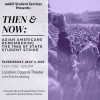









.jpg%3Fitok=IGZ2jkua)

.jpg%3Fitok=Simo8_Js)

.jpg%3Fitok=9N8yhvpj)
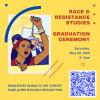
.jpg%3Fitok=cuacML7E)
_0.jpg%3Fitok=Zqtf-6oQ)
_1.jpg%3Fitok=e8bPuzai)

.jpg%3Fitok=Sdg2PdEx)




